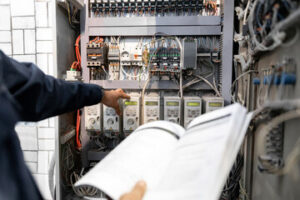Those who are looking for an electrician are not alone. The job is becoming increasingly in demand, and there are plenty of opportunities to find one. To become an electrician, you must have many skills, including troubleshooting. You will also need a solid understanding of electrical systems and knowledge of blueprints and equipment. You will also need to be a good communicator.
 Another way to identify problems with your electrical system is by measuring the circuit. A circuit breaker or switch may be the culprit. You can also check to see if the power flows through the outlet. If it is not, you will need to call a professional Electrician. Almost every building has an electrical power system. These systems power equipment and appliances. When these systems break down, a qualified electrician can repair them.
Another way to identify problems with your electrical system is by measuring the circuit. A circuit breaker or switch may be the culprit. You can also check to see if the power flows through the outlet. If it is not, you will need to call a professional Electrician. Almost every building has an electrical power system. These systems power equipment and appliances. When these systems break down, a qualified electrician can repair them.
Depending on your chosen field, electricians may spend their days on the job site or work in an office building or factory setting. Regardless of your working environment, you will likely work in a cramped space at some point in your career. You may have to stoop to the ground to get to some of the work that requires you to sweat. For example, electricians working in a factory may be tasked with maintaining the machinery atop the facility. Similarly, you may work in a warehouse containing various industrial components. Whether you are experiencing problems with an electrical outlet or circuit or have a broken light bulb, an electrician can help. By identifying the problem, you can save money on repairs.
First, make sure you have electrical troubleshooting tools. A voltage meter is a good way to identify the problem. Secondly, a GFCI tester is useful for identifying GFCI outlets. You can also check to see if there are other GFCI outlets in the house or nearby. During the troubleshooting process, you will need to wear protective gear. Make sure you label your circuits. Also, use ground-fault circuit interrupters if the outlet is in a wet location.
Blueprints are important to any construction project because they display critical information that will make the job easier for you. This includes details about lighting fixtures across the building, electrical receptacles, and the proper way to handle the job. Whether you’re an architect or a homeowner, having a solid understanding of electrical blueprints can save you a lot of headaches, money, and stress.
The best way to go about this endeavor is to find a local blueprint reading course at a vocational school or technical college. You’ll take advantage of a hands-on learning experience if you’re lucky. Identifying problems with your electrical system can take time and effort. There are many things to look for, from faulty wiring to malfunctioning equipment. These problems can be dangerous and cause expensive electricity bills.
The most obvious way to identify problems with your electrical system is to check the main supply. This will reveal any problems with switches, outlets, and wiring. You may need to add a circuit to fix the problem or relocate the lights to a different circuit.
The proper maintenance of these systems is critical to their long-term success. Regular maintenance can include changing parts or replacing control systems. These changes may be performed by a maintenance electrician or a team of specialized contractors. Regardless of the epoch, it is important to follow the proper procedures to avoid unnecessary downtime and expensive repairs.
The simplest way to go about this process is to contact your equipment operator. These operators are typically the ones who know the most about your equipment. A good maintenance plan will also include regular maintenance inspections.
Getting involved with a union as an electrician can be an excellent way to improve your career. It will allow you to meet people in the industry, find job opportunities, and gain valuable experience in your field. If you are interested in getting involved, contact the local union representative.
A union will give you various benefits, such as a pension plan. It will also ensure that you receive a fair wage. In addition to this, your union will negotiate the terms of your contract with your employer. This could include wages, working conditions, and even dental and medical benefits.
